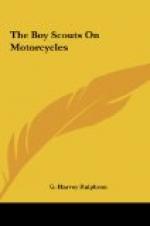Captain Martin and one marine were with the boys, the rest having been left with the wounded men.
“My flying squadron is just beginning to fly,” Ned said, as the machines rolled noisily down a hill from which the towers of the distant city showed. “And the smaller it becomes as we approach the end of the journey!”
“Suppose the Chinks attack the men left behind?” asked Jack.
“No danger of that,” Ned replied. “They are not after the marines, but the Boy Scouts who had the nerve to cross the Pacific for the purpose of bringing a rascal to punishment.”
This view of the case proved to be the correct one, as the marines were remarkably well treated by the natives, who gathered about them with many gestures and questions, all unintelligible to the warriors. The boys who were slowly drawing a slowly closing circle around the guilty ones were the persons in demand!
It was the middle of the forenoon when Ned and his companions reached the suburbs of the wonderful city. They attracted a great deal of attention as they wheeled through the straggling streets. They had not yet come to the wall, so the population was principally agricultural. Maize and millet are the principal products of the soil here, as the staple crops, wheat and rice, do not flourish well.
They had no difficulty in passing the gate which gave into the southern or “Chinese City.” It is the northern part of Peking that is known to foreigners as “The Forbidden City.” Here the rulers live in wonderful palaces. This is the old “Tartar City,” too.
The second division of Peking is the business section. Here the boys drew up at a most uninviting native inn and asked a clerk who claimed to speak English for an interpreter. A snaky-looking fellow was finally produced, and Ned proceeded to question him about the show places of the town.
“Let him think we are American tourists,” Ned said to his chums, “and we’ll stand a better chance of getting into the diplomatic section of the town. Anyway, while we are here, we may as well see the sights.”
After a midday luncheon Ned and Jimmie started out to look over the place. They were now in what is known as the general city, where the streets are from 140 to 200 feet wide. The thoroughfares are mostly unpaved, and the shops which line them are continuous, some green, some blue, some red, but all bustling with business.
The shops in this section of Peking are decorated with huge, staring signs, resplendent with Chinese characters highly gilt. Before the boys had traveled far they were forcibly reminded of the lower East Side of New York. The great thoroughfares roared with the rush of commerce.
Shopkeepers, peddlers, mountebanks, quack doctors, pedestrians rushing to and fro, all reminded the lads of the lower part of the big city on Manhattan island. The theaters and public places of amusement are situated in this part of Peking.




